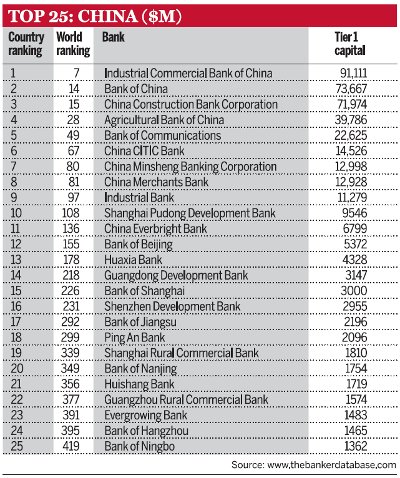China's growth story shows no sign of relenting
Every year the Top 1000 Banks ranking delivers new and startling insights into the creeping dominance of the Chinese banking sector and this year does not disappoint.
The rankings mark two milestones for the country's banks: first, China can this year claim the highest ranking for any Asian bank, with heavyweight Industrial and Commercial Bank of China (ICBC) at last surpassing Japan's Mitsubishi UFJ Financial Group to claim the number seven spot globally.
Second, China's Tier 1 contribution to the overall capital aggregate of Asian banks in the Top 1000 has broken the 50% barrier, rising to 51.2% this year from 48.77% last year. In short, China now accounts for more than 50% of the entire Asian banking sector.
This year, the country boasts 84 banks in the Top 1000 World Banks ranking, which together account for just over 8.9% of the Top 1000 Tier 1 capital aggregate, up on 8.14% last year. China's banks have also been doing their bit to boost the global banking sector's profitability. Among the Top 1000 banks, ICBC and China Construction Bank posted the greatest pre-tax profit at $24.49bn and $20.32bn, respectively, compared with $21.26bn and $17.52bn last year: remarkably, China's banks contributed a staggering 25.39% to the Top 1000 aggregate pre-tax profits.
Domestically, there have been some significant movements in the top 25 Chinese bank list, with four new entrants, Ping An Bank, Guangzhou Rural Commercial Bank, Evergrowing Bank and Bank of Hangzhou. China also boasts 15 banks among this year's top 25 highest movers, with Bank of Inner Mongolia this year's second highest mover among the overall Top 1000.
As outlined above, China continues its steady consolidation of power in the Asia region, and nowhere is this clearer than in the top 25 Asian banks list. China accounts for 40% of the top 25 Asian banks ranking by number, with ICBC, Bank of China and China Construction Bank maintaining their grip on the top three respective positions for the fourth year in a row. Agricultural Bank of China, meanwhile, has held on to the number four spot for the second year running.
China has again this year gained a new entrant to the top 25 Asians: Shanghai Pudong Development Bank, which jumped 29 places in the global ranking. If China continues to gain entrants to the top 25 Asians at the rate seen in recent years, this ranking will be comprised entirely of Chinese banks by 2024 - if not before.
The country's aggregate Tier 1 capital in the top 25 Asians, meanwhile, has this year grown again, if only marginally. Of the top 25 Asian Tier 1 capital aggregate, Chinese banks now account for 60.1%, compared with 59.96% last year and 53.44% the year before. Especially striking regionally, however, is China's lead compared with its nearest rival, Australia, which can claim just 17.9% of the top 25 Asian banks' Tier 1 capital. Regionally, China is not just ahead, it is leagues ahead.
The story of China's creeping global dominance is especially pronounced when measuring its banks against those of the other economies of Brazil, Russia, India and China (the BRICs). But a word of caution: while China's banks are ahead by many measures, when compared with their peers in Asia and the BRIC economies, their average capital to asset ratio (CAR) - generally considered a measure of soundness - is not as strong. When ranking China in terms of CAR against its BRIC peers, for example, China proves to be the least sound with an average CAR of 4.86%. The Top 25 Chinese banks, meanwhile, have a slightly higher average CAR of 5%.
However, this ratio is at least twice that of many Western banks that subsequently went on to fail during the crisis, while the average non-performing loan ratio among China's top 25 banks is just 1.01%, according to data submitted to the Top 1000. As fears abound that China's banking sector may be sailing into stormy seas, the Top 1000 list this year counsels against panic. But next year's list may yet see these indicators deteriorate.



